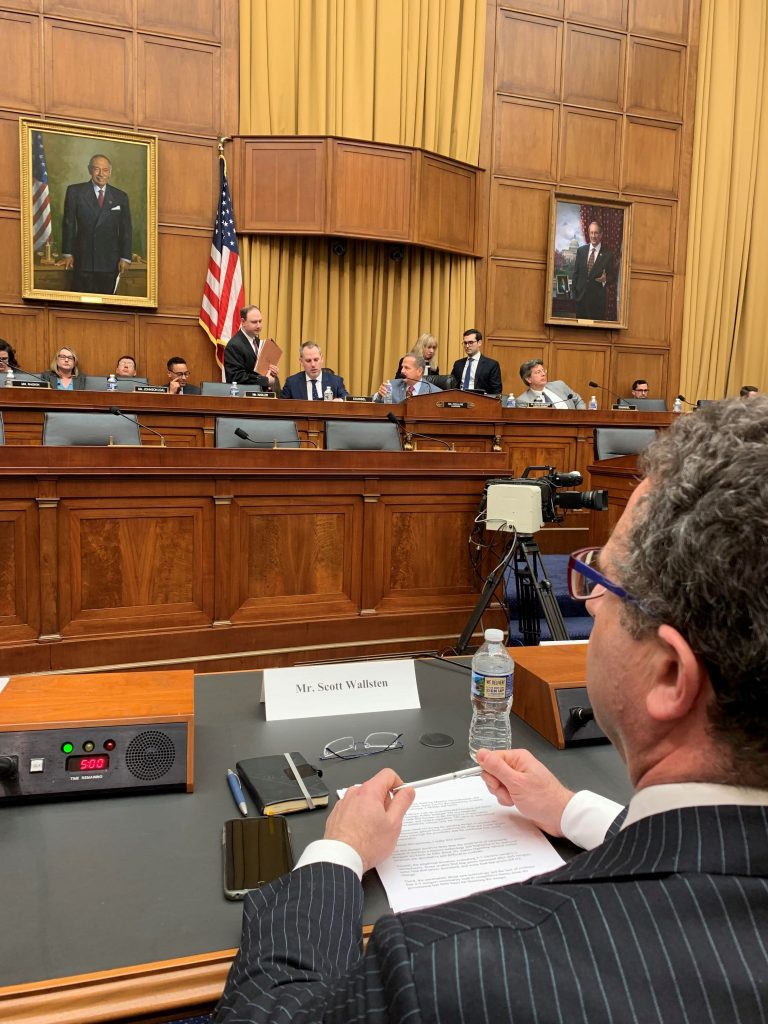Answering lawmakers’ policy questions is an important part of my job as an economist and think tank president. Usually, testifying before Congress is a great way to be of service.
That may have been the case this week at the House Judiciary subcommittee brawl over the T-Mobile and Sprint merger. I’m still deciding.
To their credit, lawmakers on both sides of the aisle listened to the panel of witnesses and asked the CEOs and opponents of the merger some substantive questions. But too many members—and the press, as it turned out— were more preoccupied with the fuchsia-clad T-Mobile CEO’s affinity for Trump hotels than with the pros and cons of the merger.
I, too, worry about potential politicization or personalization of the antitrust process. And, as everyone except John Legere understands, staying in a Trump Hotel just after announcing the merger was a bad idea. But this issue probably did not require an eternity of repetitive questioning, especially given the attention it has already, and likely will continue to, receive.
As former panel chairman Jim Sensenbrenner said, we should be more concerned with getting the policy right and using tested, data-driven, objective and non-partisan ways to analyze a merger.
The committee will undoubtedly consider everyone’s written testimony. But I was disappointed the committee did not ask University of Pennsylvania Law School Professor Christopher Yoo or me any questions during the multi-hour hearing.

It’s an honor to be asked to testify, and I had a front-row seat to some exciting fireworks, so I know I’m privileged. Perhaps I was too boring in person—economists get that a lot. After all, concluding that on balance the merger should probably be approved with conditions is a lot less exciting than full-throated support or opposition.
But the issues are nuanced and deserve to be explored fully.
Consider how the hearing handled an actual question—the effect of the merger on jobs. Both sides’ statements are clear: merger proponents argue it will create jobs, and opponents argue it will destroy jobs.
From an economics perspective, the discussion only made sense in Bizarro World. Mergers are supposed to make companies more efficient. That can mean reducing the workforce, and from a purely economic standpoint it is an argument in favor of the merger. If the workforce increases, it suggests the firm may be made less efficient, which is an argument against the merger. Thus, with respect to jobs, the firms argued against the merger and opponents argued for the merger.
Setting aside how inhumane that sounds—economists get that a lot, too—the question of the net effect on jobs must consider the broader macroeconomy. In a full-employment economy, “new” jobs take workers away from other jobs, meaning these are not net increases in the number of jobs in the economy.
Overall, we may be in a relatively full-employment economy, but that’s not true everywhere. In some places, jobs may truly be incremental. However, new jobs will probably not be in places where there is less demand for new service, which tend to be places with weaker economies.
The jobs question is complicated and controversial, and a full discussion of it may have caused everyone to leave the hearing more confused than when they went in. But that’s ok. Hearings should be an opportunity to raise difficult issues.
With the hearing over, people can do what Rick Sanchez says on the show Rick and Morty and “just don’t think about it.” After all, Congress has no real say in whether the merger is approved, and the experts at the DOJ and FCC have the data and know what they’re doing. But most of their work happens behind closed doors and involves expert reports that are redacted and otherwise inaccessible to the public.
At the least, hearings can help illuminate tough issues because the public should think about. For that reason, I’m always happy to testify, and look forward to the next, less political, opportunity.
Scott Wallsten is President and Senior Fellow at the Technology Policy Institute and also a senior fellow at the Georgetown Center for Business and Public Policy. He is an economist with expertise in industrial organization and public policy, and his research focuses on competition, regulation, telecommunications, the economics of digitization, and technology policy. He was the economics director for the FCC's National Broadband Plan and has been a lecturer in Stanford University’s public policy program, director of communications policy studies and senior fellow at the Progress & Freedom Foundation, a senior fellow at the AEI – Brookings Joint Center for Regulatory Studies and a resident scholar at the American Enterprise Institute, an economist at The World Bank, a scholar at the Stanford Institute for Economic Policy Research, and a staff economist at the U.S. President’s Council of Economic Advisers. He holds a PhD in economics from Stanford University.



